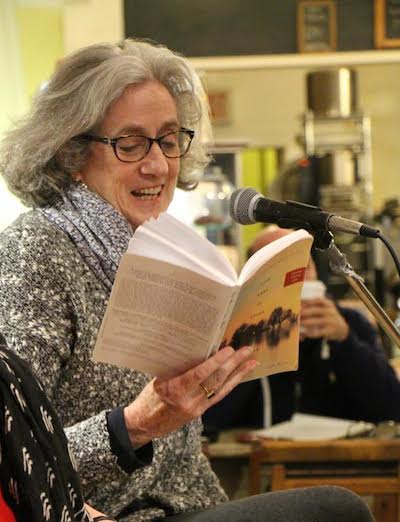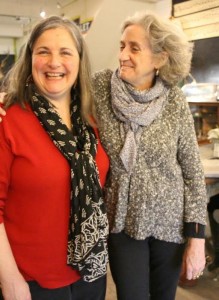April 9, 2015
 AKIKO BUSCH treated a lively, attentive, and talkative group to a lovely reading from Nine Ways To Cross a River, her memoir of river-swimming, regeneration, and river as metaphor. Though our topic was “Writing Place,” we drifted with the currents into a wide-ranging discussion of the writer’s process and craft.
AKIKO BUSCH treated a lively, attentive, and talkative group to a lovely reading from Nine Ways To Cross a River, her memoir of river-swimming, regeneration, and river as metaphor. Though our topic was “Writing Place,” we drifted with the currents into a wide-ranging discussion of the writer’s process and craft.
Akiko spoke about the need for observation and attentiveness, practices she honed as a citizen scientist, as described in her recent book The Incidental Steward. Her advice to her Environmental Writing students at Bennington rings true for all of us: “Slow down. Pay attention to details. Be specific. Get the textures, get the sounds.”
 She also talked about honoring the unexpected. Many heads nodded as Aki described how the vision in your head of what you plan to write changes through the physical process of putting words on paper. One thing leads to another, and (much like our discussion of writing about place) you find yourself following a different path than the one you preplanned. Be open to this. There is joy and surprise in discovering where your words lead you.
She also talked about honoring the unexpected. Many heads nodded as Aki described how the vision in your head of what you plan to write changes through the physical process of putting words on paper. One thing leads to another, and (much like our discussion of writing about place) you find yourself following a different path than the one you preplanned. Be open to this. There is joy and surprise in discovering where your words lead you.
Bobbi Katz recited a line from A Fly in the Soup, a memoir by poet Charles Simic: “Words make love on the page like flies in the summer heat, and the poem is as much the result of chance as it is of intention.”
Several questions addressed specific issues. If you want to provide a detail such as what bird you hear singing, but don’t know the answer, what do you do? Akiko talked about doing online research after the fact, once you know what it is that you need to fill in. Nina pointed out that there’s a difference between naming and detail. Sometimes what you need is not the name of the bird, but the musical quality of its song. Is it liquid, harsh? Does it sound like a flute, run up and down scales, repeat patterns? What will help your reader share your experience of hearing that bird?
What does it mean if you find yourself going back to the same material over and over? Akiko and Nina agreed that we all revisit the subjects that resonate most for us. Returning to the same pool again and again probably means you’ve tapped into a very deep spring, and there’s more to bring up.
THE EXERCISES:
Akiko suggested writing a memory from childhood that involves water: being on, near, close to, or in the water.
Nina suggested describing a place that was important to you as a child, whether indoors or out, using all five senses, but no adjectives or adverbs.
Try both of these. See what watery memories your bucket brings up, and how the ban on adjectives and adverbs forces you to choose verbs and nouns that make readers feel, hear, smell, taste, and see what you’re writing about.